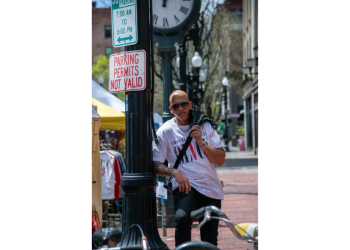Per the statement, Eastman is accused of making false and misleading statements regarding alleged election fraud — including claims he made at a rally at the Ellipse outside the White House that preceded the deadly riot at the U.S. Capitol on Jan. 6, 2021. In the explanation of the charges, the California bar directly connects Eastman’s speech to the insurrection, saying he “contributed to provoking a crowd to assault and breach the Capitol to intimidate then-Vice President [Mike] Pence and prevent the electoral count from proceeding.”
Stephen Gillers, a professor at the New York University School of Law who specializes in legal ethics, called the set of accusations levied at Eastman “scathing.”
“[It] charges Eastman with knowingly or through gross negligence failing to support the U.S. and California constitutions, which he took an oath to do,” Gillers said. “The allegation that Eastman is guilty of ‘moral turpitude’ is an attack on his very character, in other words that he is a bad man, not merely a bad lawyer.”
The state bar’s announcement came after an investigation that lasted nearly a year. Cardona’s office concluded that Eastman violated Section 6106 of the Business and Professions Code “by making false and misleading statements that constitute acts of ‘moral turpitude, dishonesty, and corruption.’”
“There is nothing more sacrosanct to our American democracy than free and fair elections and the peaceful transfer of power,” Cardona said in a statement. “For California attorneys, adherence to the U.S. and California Constitutions is their highest legal duty.”
Eastman, Cardona added, “violated this duty in furtherance of an attempt to usurp the will of the American people and overturn election results for the highest office in the land — an egregious and unprecedented attack on our democracy — for which he must be held accountable.”
Eastman’s lawyer Randall A. Miller said Trump’s election adviser disputes “every aspect” of the California bar’s actions.
“Any lawyer engaged to provide his or her legal assessment in a dynamic, consequential, and often emotional arena should be deeply troubled by the notion that a licensing authority (bar) can take their license if they do not like the lawyer’s advice, or find the advocacy distasteful,” Miller said.
Eastman has been dubbed the “architect” of Trump’s plot to steal the 2020 election. He wrote an infamous memo that laid out several ways Pence could facilitate not certifying Joe Biden’s victory. The former law professor at Chapman University’s School of Law, who is an active member of the Federalist Society, argued that Pence could reject electors from states won by Biden.
Eastman refused to turn over thousands of emails to the House special committee investigating the insurrection. The panel requested the documents because they were related to Eastman’s role in trying to persuade Pence to reject these electors. Eastman cited attorney-client privilege as a shield against turning over the documents because he has said he was representing Trump at the time.
The committee argued that Eastman’s claim of privilege was potentially voided by the “crime/fraud exception” to the confidentiality usually accorded attorneys and their clients, which holds that communications need not be kept confidential if an attorney is found to be assisting their client in the commission of a crime.
Ultimately, the committee recommended that the Justice Department investigate and prosecute Eastman on two counts. The panel concluded that Eastman knew “in advance of the 2020 election that Vice President Pence could not refuse to count electoral votes on January 6th.”
The State Bar of California came to the same conclusion, saying that Eastman’s strategies “were unsupported by law” and “based on false and misleading assertions of fact and designed for the purpose of keeping Trump in office.”
In its disciplinary notice, the State Bar concludes that Eastman “knew, or should have known, that the factual premise for his proposals — that massive fraud was at play — was false, and that Trump had lost his bid for re-election.” Cardona’s office also alleges that Eastman chose to ignore these facts when he spoke at the Jan. 6 rally.
In the 35-page notice, the California bar’s supervising attorney Duncan Carling wrote that, from on or about Dec. 9, 2020, until at least Jan. 6, 2021, Eastman “continued to work with Trump and others to promote the idea that the outcome of the election was in question and had been stolen from Trump as the result of fraud, disregard of state election law, and misconduct by election officials.”
If the State Bar Court decides that Eastman’s actions warrant a disbarment or suspension, the recommendation would be forwarded to the California Supreme Court, which will determine Eastman’s fate.
The move to file disciplinary charges against Eastman was applauded by the States United Democracy Center, a Washington-based group promoting fair and secure elections that in a statement described Eastman as the “mastermind” of the plot to overturn the 2020 election.
“He abused the legal system and violated the oath he swore as an attorney, in an attempt to block the will of the people and prevent the peaceful transfer of power,” said Christine P. Sun, the group’s senior vice president of legal.
























